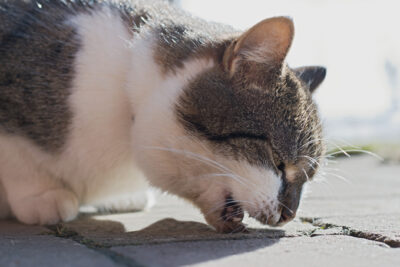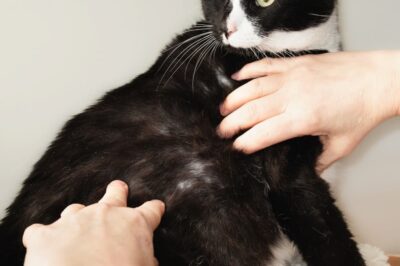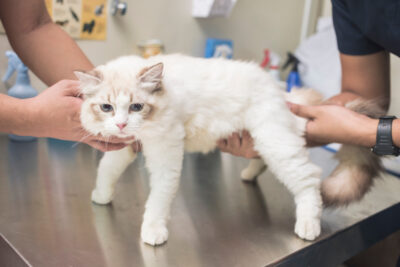Lethargic Cat: Causes and How to Help

Cats are inherently lazy by nature, but a lethargic cat is trying to tell us that something is wrong and that they need help. Being observant to any changes in your cat’s behavior, especially to changes in their energy level, can potentially identify and/or prevent a serious medical situation.
What is Lethargy in Cats?
Lethargy is defined as a noticeable decrease in energy and activity levels. For example, if you have a kitten who is usually playful and suddenly becomes withdrawn and uninterested in play, they may be experiencing lethargy.
Another telltale sign of a lethargic kitten or cat is an abrupt change in their behavior. If you have a normally lazy cat and they do not show up for meal time or are hiding more than usual, it’s possible that they are experiencing lethargy.
It’s important to note that some cats are simply more laid-back and may appear lazy at times. A lazy cat consistently exhibits low energy, while lethargy represents a sudden change in behavior. To help identify lethargy, pay attention to your cat’s daily habits. Some red flags may be if they are suddenly less active, seem disinterested in food or play, or are grooming less often. Additional signs to watch for include hiding, changes in litter box habits, or unusual vocalizations, all of which can further indicate that there is a problem.
What follows is everything you need to know about lethargy in cats.
What Causes Lethargy in Cats?

Lethargy is a non-specific symptom of a bigger problem. As such, there are many causes of lethargy in cats that can range from minor issues to more serious health concerns.
Infections
Cats can suffer from various infections, including of the respiratory and urinary tracts, which can lead to fatigue and lethargy. These infections could be bacterial, viral, or fungal in origin.
Pain
Chronic or acute pain conditions, such as arthritis or dental problems, can significantly impact a cat’s energy levels, which can cause them to withdraw and become less active.
Illnesses
Serious health issues like diabetes, hyperthyroidism, kidney disease, and heart disease can manifest as lethargy. These conditions often require veterinary intervention.
Stress and Anxiety

Cats are sensitive creatures. Changes in their environment—such as moving to a new home, introducing new pets, or loud noises—can lead to stress, which may result in lethargy.
Dietary Issues
Poor nutrition or food sensitivities can cause lethargy. If your cat is not receiving the necessary nutrients or is allergic to certain ingredients, their energy levels may be affected.
Medications
Some medications, especially pain relievers or sedatives, can cause drowsiness and lethargy as side effects.
Parasites
Infestations from fleas, ticks, or worms can also lead to fatigue as your cat’s body fights off these invaders.
Vaccination
Recent vaccination can cause lethargy as a normal side effect. You may also notice that they are a little achy and feel warmer than usual.
When Should You Worry About a Lethargic Cat?

I have gone through my own personal experience with a lazy cat that experienced lethargy. My cat Zoey would always come to the table at dinner time. One day she didn’t come for dinner. I thought it was just a fluke and I was overreacting. Then it happened again and again and again.
By the fourth day, I grew concerned and went looking for her. She was hiding in the closet and I noticed she was drooling and her skin was yellow (icteric). If I had taken her in for bloodwork sooner, she would not have gotten as sick as she was and she would not have to have been hospitalized for several weeks.
She is a happy and healthy 15 year old now, but I still think back to those days when she was so sick and wish I had taken action sooner.
This is why it’s so important to understand your cat’s normal behavioral patterns and lifestyle. When there is a change in that behavior, additional action should be taken.
Other Lethargic Cat Symptoms
If your cat is lethargic, you should also monitor for additional issues that could be signs of a larger problem. These symptoms can include:
- Weakness or difficulty walking
- Heavy breathing
- Poor or no appetite
- Vomiting/diarrhea
- Drooling
- Fever
- Sneezing/coughing
How to Help a Lethargic Cat: Next Steps

If you suspect that your cat is experiencing lethargy, taking prompt action is important. Here are some suggestions on what to do if you are concerned about a lethargic cat or kitten.
Observe Behavior
Start by closely monitoring your cat’s behavior. If lethargy is present with no additional symptoms, it may be possible to monitor for a day or two before calling your veterinarian. Make sure to record any changes in activity levels, eating habits, grooming, and interactions with family members.
Check for Other Symptoms
Look for additional signs of lethargy in cats (see list above) that may indicate a health issue. Take note of any symptoms that accompany the lethargy. If the additional symptoms are severe (like vomiting and inappetence), then you will want to seek care quickly.
Ensure Comfort
Make sure your cat is comfortable and has access to water and food away from any potential stressors like a new pet or loud family member. Sometimes a cat may just need a bit of rest, but it’s important to keep an eye on them.
Consult a Veterinarian

If lethargy persists for more than a day or two, or if your cat shows additional concerning symptoms, contact your veterinarian as soon as possible. Provide them with the observations you’ve noted, as this will help in diagnosing the issue.
Your veterinarian will perform a thorough physical exam. They may also recommend additional testing, including bloodwork, urinalysis, fecal exam and imaging studies (like X-rays or ultrasound). Because lethargy is such a non-specific symptom, your veterinarian will need to gather more information to properly diagnose what is making your cat lethargic.
Depending on the diagnosis, the vet may recommend various medications, prescription diets or lifestyle changes. Follow their guidance carefully and attend any follow-up appointments as necessary.
Once the cause is identified and the appropriate treatment is started, your cat may start feeling better within 24 hours. More chronic conditions may take longer and need more management to get them feeling like themselves.
To help reduce the risk of future health issues, ensure your cat receives regular veterinary check-ups, eats a balanced diet, and is surrounded by a safe, stimulating environment. Keeping your cat’s vaccinations up to date and preventing parasites are also essential steps in maintaining their health.
Lethargic Cat: The Bottom Line
While it can be easy to overlook a cat’s lethargy as just them being lazy, knowing when to act is key to their well-being. Understanding what lethargy is, recognizing its signs, identifying potential causes, and knowing how to respond can make all the difference in your cat’s health.









